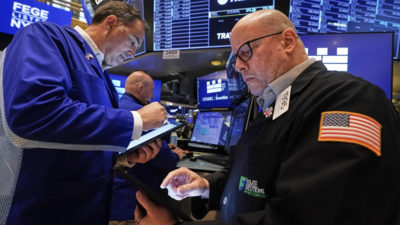ARTICLE AD BOX

The US stock market opened sharply lower on Friday as investors reacted to a surge in oil prices and rising bond yields after Israel launched a wave of airstrikes on Iran, escalating Middle East tensions.The Dow Jones Industrial Average dropped over 480 points, down 1.12%, while the Nasdaq and S&P 500 also slipped, pressured by growing concerns around inflation and economic uncertainty, initial minutes of trading.As of 9:54am ET, the Dow Jones Industrial Average was down 573 points (-1.33%) at 42,394.48, while the S&P 500 dropped 49.15 points (-0.81%) to 5,996.11, and the Nasdaq fell 170.12 points (-0.87%) to 19,492.36.Meanwhile, safe-haven assets like gold rallied strongly, climbing nearly 1.75%, as risk appetite waned. Oil prices jumped nearly 8%, intensifying worries about supply constraints and their potential impact on the economy.The 10-year Treasury yield ticked higher to 4.385%, reflecting ongoing shifts in interest rate expectations. Currency markets also saw the dollar strengthen against the euro, signaling increased demand for US assets.
Shares of oil companies like Chevron and oil services players such as Halliburton rallied as oil prices surged about eight percent following the Israeli strike, AFP reported. Meanwhile, Brazilian meat giant JBS shares fell 6% in early trading Friday as the company made its long-awaited debut on the New York Stock Exchange, AP reported. The listing marks a major milestone for JBS, which was founded 72 years ago and has grown into one of the world’s largest meat producers.
The US is a critical market for the company, accounting for roughly half of its annual revenue and employing over 72,000 people. JBS is currently the largest beef producer in the US and ranks second in poultry and pork production. The move to list in New York follows a shareholder vote last month in favor of the company's dual-listing plan on both the São Paulo and New York stock exchanges. The approval came despite vocal opposition from US lawmakers, environmental organizations, and others who pointed to JBS’s history of corruption, monopolistic practices, and environmental damage. JBS has defended the dual listing as a strategy to broaden its investor base and improve access to financing. The company said the move would allow it to secure "more competitive interest rates," supporting its future growth. It also noted that a US listing would subject the company to "more oversight from regulators." The US Securities and Exchange Commission approved JBS’s listing plan last month.



.png)
.png)
.png)
















 17 hours ago
3
17 hours ago
3









 English (US) ·
English (US) ·